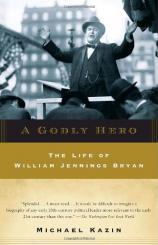A Godly Hero: The Life of William Jennings Bryan
Review
A Godly Hero: The Life of William Jennings Bryan
Unfortunately, for his place in history, William Jennings Bryan's
life ended not in a blaze of glory but in an ignominious defeat
suffered in a courthouse in Dayton, Tennessee. Bryan's unyielding
literal interpretation of the Bible elicited during questioning by
Clarence Darrow in the Scopes Monkey Trial turned the conviction of
John Scopes into a pyrrhic victory at best. The case spawned the
Broadway play and Hollywood movie Inherit the Wind, in which
Frederic March portrayed Bryan as a religious zealot consumed by a
view of the Bible that was, to most, laughable. This portrayal,
coupled with Bryan's standing in history as the only
thrice-defeated major party presidential candidate, has seriously
damaged Bryan's standing as a significant figure in American
political life.
Michael Kazin has undertaken to re-examine the life of the man
known as "The Great Commoner" in A GODLY HERO: The Life of William
Jennings Bryan, an outstanding political biography of the man whose
career strongly influenced the modern Democratic Party and the
presidencies of Franklin Roosevelt, Harry Truman and Lyndon
Johnson.
Kazin has written an even-handed saga of Bryan's career showing no
reluctance to portray his subject in both his moments of glory and
accomplishment, along with his failures and flaws. Bryan was a
complex man whose political life was heavy with irony. Born in
Salem, Illinois and educated at Illinois College in Jacksonville,
Illinois, the young Bryan was trained in the law, the ideal career
for one with his oratorical skills and political ambitions. He
practiced law successfully in central Illinois for four years, but
he was lured to the West, where his populist political views seemed
more in fashion with the citizens. There Bryan became a major
figure in Democratic politics throughout the progressive era. But
his tenure in elected political office was limited. He served two
terms in Congress from the state of Nebraska, and those two
elections marked his only electoral victories. During the first
decade of the twentieth century Bryan was the titular leader of the
Democratic Party but held no political office and had no record of
political accomplishments upon which to build a campaign
structure.
Despite the lack of political office, he was a hero to millions.
After his second presidential defeat in 1904, he traveled around
the world. Upon his return to the country in 1906, Democrats from
across the country poured into New York City to welcome Bryan home.
A capacity crowd filled Madison Square Garden to hear the great
orator report on his travels. As a public speaker Bryan had no
equal in the nation.
Bryan campaigned endlessly as a common man with a political
platform of support for the working class, but his speaking tours
and publications allowed him to lead a life of affluence that
included an estate in Nebraska and a 240-acre ranch in Texas. Since
he held no public office and never developed a law practice, it was
speaking tours and his magazine, The Commoner, that provided
Bryan with income. He often charged $500 per speech and received a
percentage of the proceeds of the gate, a tidy source of income in
the early 1900s.
But Bryan could never transform his ability to mesmerize a crowd
into votes. His political difficulty was succinctly summarized by
one attendee at a speech who told Bryan how impressive the speech
was, remarking, "I would vote for you if only I wasn't a
Republican." Three times, Bryan whistle-stopped across the nation
in quest of the Presidency in an era when presidential candidates
rarely left their homes to campaign. On each occasion the goal of
the Presidency eluded the candidate.
By 1912, Bryan's presidential ambitions were dead. In another
irony, the man who railed against political bosses and dealmakers
swung his support at the Democratic convention to Woodrow Wilson
and was rewarded with appointment as Secretary of State. Bryan
actively supported Wilson's progressive domestic platform and
worked vigorously to pass crucial legislation, but Bryan and the
President disagreed on important foreign policy matters. After
three years in the Wilson cabinet, Bryan resigned as Secretary of
State in protest over the increasing interventionist positions of
the Wilson administration.
Bryan was a complex man living in a complex political world. He
fought for the poor but lived the life of a wealthy man. His
support of populism was limited to white males. Democrats of
Bryan's era were dependent on white Southern voters for their base
of support, and Bryan endorsed Jim Crow laws throughout his
lifetime. His politics were grounded in Christian morality and are
difficult even today for many progressives to incorporate into
their political agendas.
There are striking similarities between the Americas of the first
decades and of both the twentieth and twenty-first centuries.
Populism remains a crucial element in our nation's politics,
whether from the liberal advocacy of economic security or from the
conservative support of moral certainty. The echoes of William
Jennings Bryan's words and views can still be heard in contemporary
politics. A GODLY HERO is an important and relevant book for anyone
interested in what political path our nation may travel in future
years.
Reviewed by Stuart Shiffman on January 22, 2011
A Godly Hero: The Life of William Jennings Bryan
- Publication Date: March 13, 2007
- Genres: Biography, Nonfiction
- Paperback: 432 pages
- Publisher: Anchor
- ISBN-10: 0385720564
- ISBN-13: 9780385720564




